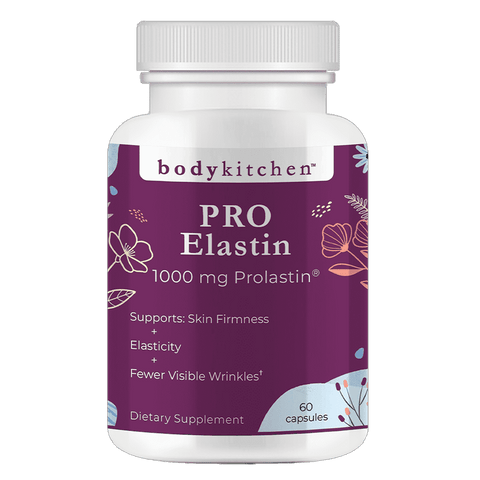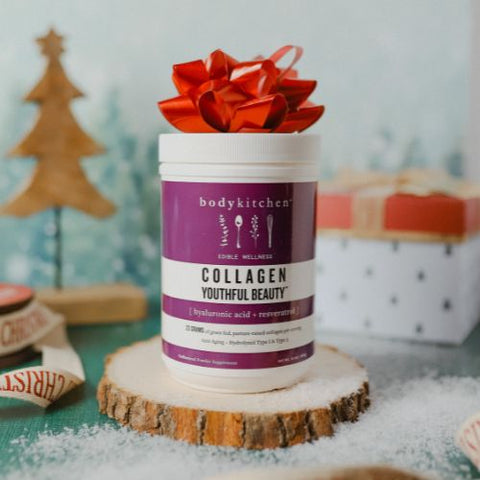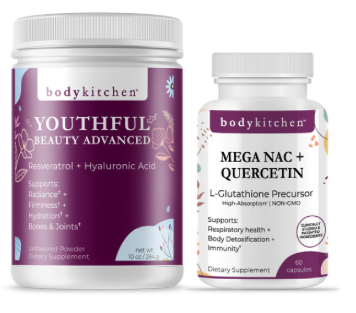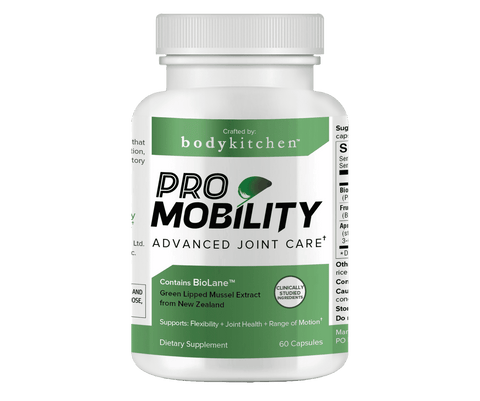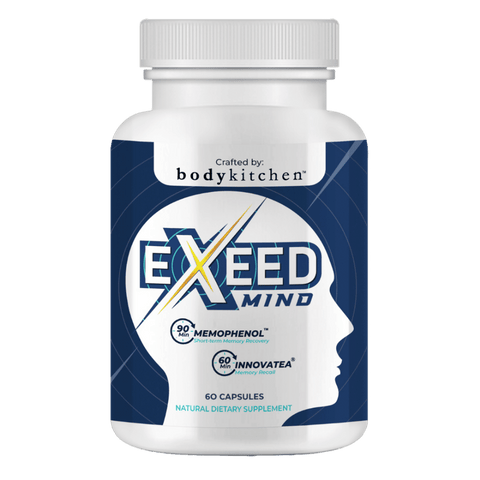Effects of Diet, Nutrition and Lifestyle on Skin Health: The Role of Collagen and Elastin in Skin
It may not come as a surprise that the integrity of our skin is vital to overall health. As our largest organ, the skin commonly protects us from germs, chemicals, harmful UV rays, and even from injury.
Additionally, our skin often helps regulate body temperature, make vitamin D from the sun, and interacts with the immune system. And, it goes without saying, that our skin can allow us to feel and process the world around us.1
Needless to say, the health and vitality of our skin is important!
And while most of us think of our skin only in terms of beauty, which is certainly understandable, there’s clearly so much more.
The roles of collagen and elastin can be a critical piece to optimal looking skin. In fact, the use of collagen for skin health is a huge part of the beauty industry. Collagen supplements seem to be everywhere, and the market is only growing.
This fact begs the questions: what does collagen do for skin, and should you be taking a collagen supplement?
To answer these questions, this article will talk about how to take care of your skin nutritionally, how collagen benefits the skin, and the best collagen supplements for skin health.
Key Nutrients for Skin Health
When it comes to skin health, there is no one magic nutrient that does it all; we may need a host of dietary nutrients on a regular basis to keep our skin at its best.
Nutrients, such as protein, vitamin A, vitamin D, vitamin C, vitamin E, biotin, zinc, and omega 3s, just to name a few, all have research showing their helpful benefits for healthy skin.2
These key nutrients may all play a role in reducing inflammation and protecting the integrity of the skin. Research has shown that the above nutrients can be effective when taken orally from food and supplements, but in some cases, may also be used topically.2
A diet that’s high in these critical nutrients cannot be overemphasized. In fact, studies noted that poor nutrition worsens the condition of the skin.2
Inflammation from a poor diet may cause collagen in the skin to break down, leading to saggy skin and wrinkles, and may also contribute to other conditions such as acne, rosacea, and psoriasis.3
A Mediterranean diet, with a wide variety of fruits, vegetables, legumes, nuts, seeds, lean meats, and fish is thought to be a good way to make sure that all of these needs are met.
What is Collagen? Understanding Collagen and Elastin’s Role in Healthy Skin
While not a nutrient per say, collagen is thought to be another integral part of skin health. Collagen is actually a series of amino acids, i.e., protein, which provides strength and elasticity to joints, muscles, bones, connective tissue, cartilage and, of course, our skin.3
Elastin works similarly to collagen. Also, a protein, it can lend extra stretchiness and flexibility to the skin and other tissues. Think of it like a matrix for keeping everything in its place but also by adding strength and elasticity.4
Our bodies make both collagen and elastin from the proteins that we consume regularly. But due to aging and other lifestyle factors, they become harder for our bodies to produce, as well as break down over time.1
This can lead to visible signs of aging such as wrinkles, dehydrated skin, thin skin, and more.
How Collagen and Elastin Supports Youthful Skin
But … research is showing that supplemental collagen may help reverse or prevent these effects. According to studies, collagen supplements may help the skin to:
-
Improve skin elasticity: A randomized control trial by 72 women found stronger, more supple skin in those that supplemented with collagen for 12 weeks5 than those who did not.
-
Increase skin hydration: A review of 19 studies found that there was better skin moisture in people who supplemented with collagen than in those who didn’t.6
-
Improve skin smoothness: A double-blind, placebo-controlled study with 100 participants found that those who supplemented with collagen for 12 weeks saw less roughness in the skin than those who did not receive the supplement.7
-
Reduce wrinkling: A review of 12 studies found less wrinkling in those that supplemented from collagen, whether orally or topically used.8
While there is less research regarding elastin, evidence is showing that it too may work much the same way, with elastin supplements offering similar benefits to our skin.9
Collagen and Elastin: How Do We Get It?
Collagen supplements are an easy option here. Studies are showing good results with supplemental collagen, and even some evidence with supplemental elastin.9
It’s been suggested that anywhere from 2.5 g per day up to 10 g per day can be effective.10
What about food sources? Since our bodies can make collagen, a diet rich in a variety of protein sources is important in order to make sure that we get all the necessary amino acids that we need. Additionally, foods that contain collagen, such as meat and broth, could be useful as well. While animal meats can provide small amounts of collagen, bone broth is actually our richest source of dietary collagen.11
But the problem with bone broth boils down to how much collagen you are actually getting. According to studies, the way that the broth is prepared may affect how much collagen is in the final product, and so both commercial and homemade varieties may vary widely.11 While bone broth is still a great option, there is just about no way to make sure that you are getting the same amount daily.
For those wanting a consistent, daily dosage for the most reliable results, a high-quality collagen supplement may be the best option.
What is the Best Collagen Supplement?
If taking a collagen supplement seems like the best option for you, do your research. Not all supplements are created equally.
The best collagen for skin, according to studies, is likely from bovine or marine sources.12 There are less studies on collagen derived from poultry and pork. Religious constraints or allergies may also need to be taken into consideration. Collagen supplements usually list what source they are from, so double check the label.
Also, make sure that you are buying from a reputable company. Reputable companies typically use clinically backed ingredients so that you know that you are getting a formula that is not only high-quality but is also effective.
And of course, before starting any new supplement, speak with your healthcare provider first. Collagen supplements with less than 15 g per day are generally safe,13 but make sure the supplement fits with your overall health goals, and check that your diet is balanced and full of skin-supporting nutrients at the same time.
The Bottom Line
The health of our skin is just as important as any other organ of the body. How we care for it can impact everything, from internal health to outward appearance.
Thankfully, we have many easy-to-manage tools to keep our skin at its healthiest. A healthy diet is typically the best place to start, but collagen supplements can be a terrific way to help with skin elasticity, hydration, smoothness and even fine lines and wrinkles.
Remember, that even the best collagen supplement can only do so much for your health. Be sure to eat a balanced diet, reduce stress, and stay active for optimal wellness, inside and out.



